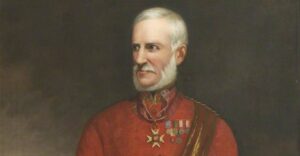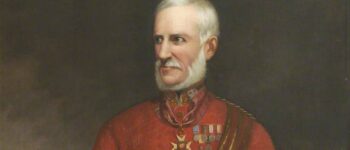1857: Havelock History
July 17, 2022
By AHNZ
 Today in history, 17 July, 1857, Henry Havelock became a hero to our Victorian ancestors. The seasoned old soldier’s tactics had quelled the Indian Mutiny and taking back the town of Cawnpore. He also held out during the siege of Lucknow alongside the civilian administrator Henry Lawrence.
Today in history, 17 July, 1857, Henry Havelock became a hero to our Victorian ancestors. The seasoned old soldier’s tactics had quelled the Indian Mutiny and taking back the town of Cawnpore. He also held out during the siege of Lucknow alongside the civilian administrator Henry Lawrence.
Best of all, Havelock died on the job so The State could celebrate and honor him without blowback. Dead men can’t go on to tarnish their reputations. Nor do those who cannonise the dead and invest power and fame in them need to worry that it can be used. Dead people are safe for official people to elevate. The siege of Lucknow killed Havelock and he died shortly after its successful relief.
Colonial New Zealand was all on board with Henry the military celebrity when it named two towns after him. The other Henry, Lawrence, also died at Lucknow and it is for him that Lawrence, Otago, was named.
Havelock, Malborough, is the little fishing town home to our world-famous physicists William Pickering and Ernest Rutherford. They have an iconic green mussel down the main street. The main street of Havelock is named Lawrence after the other Henry.
Havelock North, Hawke’s Bay, is remarkable for being home to a sect of the Order of the Golden Dawn. G.I. Generation and Silent Generation New Zealanders kept an Occult Secret Society going that dominated the town until the Boomer Generation came along. One of the main signs remaining of this is their pentagram round-about. This would have been more conspicuous in the past before c.1960s but these days roundabouts are commonplace.
“There was one name which England would never forget in connection with this event-—a name which the rescued would ever cherish—a name that would shine…That name was Henry Havelock…Fathers will tell it to their sons, and they again to theirs, and “Havelock” will become a name revered and honored by the brave and true in all time to come.” – Rev. John Ellis, lecture on Havelock, The Colonist (Nelson, 1857;) Papers Past
“17 July: Cawnpore taken by Havelock, 1857” – Southern Provinces Almanac (1868)
“Whare Ra was more than just an occult group. It was a secret society—most of its members were high members of the local community that controlled it. Not only did Whare Ra have control of the Havelock North Council, but it also had members on the Napier and Hasting councils. There were a few Members of Parliament, senior clergymen and a couple of governor-generals who could be called upon as loyal members….In the centre of the village there still is a roundabout where five roads meet—like the five points of a pentagram. The upper point (which Whare Ra attributed to “spirit”) points towards its temple.” – Beyond the Sun: The Occult Order That Ran a Town, Nick Farrell; Graham Hancock (2019)
“The Havelock Work was an arts and spirituality movement in the small town of Havelock North, New Zealand, begun in 1907 by Reginald and Ruth Gardiner and Harold Large, and later embraced by the whole town. It culminated in the founding of the Smaragdum Thalasses temple, better known as the Whare Ra, the longest-standing temple of the Stella Matutina magical order.” – Havelock Work, Wiki
Several layers of New Zealand history revisionism has buried the memory of Havelock and Lawrence. Very few alive today would know why our places are named for them any more than they would know the story of Wellington and Picton. The lost connections make it easy to retire the Old Conformity culture that was ‘New Zealand’ with place names, business and government names, pronunciations, brands, etc. with the new Conformity culture entitled ‘Aotearoa New Zealand’. The Millennial and Zoomer Generations have no idea about the heritage and history of their country they’re surrendering because they’ve been socialised and educated without any reference to it.
It is very possible that Havelock, Lawrence, and Havelock North will be re-named with pseudo-Maori names some time during the current Aotearoa New Zealand era before it ends. Firstly, with bilingual names on the grounds of diversity and opposition to monoculturalism. Then, the Anglo-Zelandian names are dropped entirely in favor of “restoring” an “indigenous” name which will have become the new priority as the diversity/anti-monoculture ideal is dropped and forgotten. If there is no old Maori name to be found then one will be invented on the spot without any meaning and the historic one full of meaning dispensed with. This process is underway already. Eg. Christchurch, Auckland, Mt Egmont.
The Victorians saw Havelock and Lawrence as heroic. They saw them as saving a civilian population of their own people under siege and turning back barbarians at the gate. A revisionist interpretation would gloss over all that and instead see Western alien invaders being forcefully told to get out of India and go ‘home’ where they belong. This is also what helps make it OK that Hong Kong has fallen to China; We lost empathy for our people there. Aotearoa New Zealanders in the early 2020s have more empathy for Slavic people under siege in The Ukrane on TV than they do for their own people in the past or present. If Western territory in the Pacific Islands is lost to China there will be no public outcry if it is presented as “returning” to native people their “whenua.” After enough loss of this kind is sustained, and if we survive, a new Conformity will overturn Aotearoa New Zealand culture by remembering again the Havelocks and Lawrences we let ourselves forget about.
—
Image ref. Henry Havelock, George Frederick Clarke; wikioo.org
Update 2023: It’s happening. Ref. Māori place names are being added to new road signs in Hastings, 1 News (May 2023)
 Like Comment Share
Like Comment Share






One thought on "1857: Havelock History"